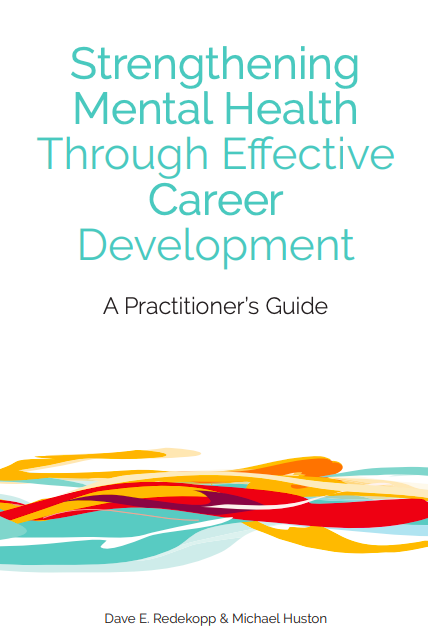- Home
- About Us
- The Team / Contact Us
- Books and Resources
- Privacy Policy
- Nonprofit Employer of Choice Award

O ur first worry is that the great interest in mental health/illness has pitted and may continue to pit “mental health” against “career development.” Consider policy-makers, funders, and organizational administrators reviewing their finite budgets and having to make decisions about where to allocate resources. The human resources department in a corporation, for example, might decide to devote a portion of its budget to stress management workshops, mental health awareness, or mindfulness tools for employees. These initiatives may well be effective, but if the decision to pursue them is made at the expense of supporting the core career development needs of employees, the HR department may do the organization and its employees a great disservice. By reducing support for career development in favour of funding targeted mental health initiatives, the HR department may inadvertently increase the likelihood of negative mental health outcomes resulting from issues such as poor employee-role “fit,” inappropriate workload demands, or career path blockages. The symptoms of some of these issues (e.g., anxiety, disengagement, stress) may be alleviated by mental health initiatives, but their causes will not be addressed if services that get to the root of problems are removed, reduced, or absent altogether.
ur first worry is that the great interest in mental health/illness has pitted and may continue to pit “mental health” against “career development.” Consider policy-makers, funders, and organizational administrators reviewing their finite budgets and having to make decisions about where to allocate resources. The human resources department in a corporation, for example, might decide to devote a portion of its budget to stress management workshops, mental health awareness, or mindfulness tools for employees. These initiatives may well be effective, but if the decision to pursue them is made at the expense of supporting the core career development needs of employees, the HR department may do the organization and its employees a great disservice. By reducing support for career development in favour of funding targeted mental health initiatives, the HR department may inadvertently increase the likelihood of negative mental health outcomes resulting from issues such as poor employee-role “fit,” inappropriate workload demands, or career path blockages. The symptoms of some of these issues (e.g., anxiety, disengagement, stress) may be alleviated by mental health initiatives, but their causes will not be addressed if services that get to the root of problems are removed, reduced, or absent altogether.
As we articulate in subsequent chapters, career development interventions and processes strengthen mental health and can create protective factors against mental illness. Choosing “mental health” over “career development” in a community, organization, school, or postsecondary institution may help administrators show they are doing something about mental health, but choices that make for good optics may perpetuate the problem.
Think about it this way: If a hospital administrator was faced with an unsanitary water supply and limited resources, would the administrator choose to fund antibiotics over clean water? Both contribute to health/ illness and both cost money. Antibiotics may help cure the problems caused by dirty water, but dealing with the dirty water certainly cannot be abandoned if there is to be any hope of lowering the antibiotics budget. Luckily, in this case and many others, the choice is obvious and the need for balanced funding is reasonably easy to see. In the case of “mental health” versus “career development,” the choice is perhaps less clear, particularly to those outside the career development profession.
Career development interventions can result in a broad range of career development outcomes, including significant personal, social, economic, and work-related changes. Employment outcomes are vitally important, and though they are one type of outcome—the tip of the iceberg really—it is the one our field has measured, and measured well, because our livelihood as a profession has depended on it. Our field has not made the case that career development interventions are mental health protective factors. Administrators cannot be blamed for choosing “mental health” over “career development”: We have not provided evidence of the connections between the two.
To download your free copy of Strengthening Mental Health Through Effective Career Development: A Practitioner’s Guide, click here.
Based in Edmonton, Alberta, author Dave Redekopp is the national award-winning President of Life-Role Development Group Ltd. He has devoted more than 30 years to the development of better career development and workplace concepts and practices.
Co-author Michael Huston is a long-standing associate at Life-Role Development Group as well as a career development practitioner, and Associate Professor and Counsellor at Mount Royal University in Calgary, Alberta.